Considered
 174
174
of Research
 53
53
Examined
 9
9
Interviewed
Tracking fitness levels has become a major part of amateur and professional cyclists to carefully monitor their vital signs and help them achieve their best performance.
What if the tracker you're using isn't optimized for your needs?
As a health and fitness coach, I tried several devices to ensure that your data is accurate on your next ride.
Prepare to be amazed as we reveal the top fitness tracker for cycling that we'd like to introduce you to.
The Best Fitness Tracker For Cycling
- Best Overall Fitness Tracker for Cycling: Garmin fēnix 5S Plus
- Cheapest Fitness Tracker for Cycling: Fitbit Charge 3 Fitness Activity Tracker
- Best Value Fitness Tracker for Cyclists: Fitbit Versa 2
- Best All-Rounder Smartwatch Tracker for Cycling: Apple Watch Series 8
- Best GPS Precision Fitness Band for Cyclists: Coros PACE 2
- Best Fitness Tracker for Intensity-Based Training in Cycling: Polar Vantage V
- Best Multi-Sport Fitness Tracker for Cycling: Polar M430 GPS Running Watch
- Best User-Friendly Display Fitness Tracker for Cycling: Suunto 3 Sports Watch
- Best Long-Lasting Battery Life Fitness Tracker for Cycling: Withings Steel HR
Our Top Fitness Tracker For Cycling (June 2025)
1 - Garmin fēnix 5S Plus (Best Overall)
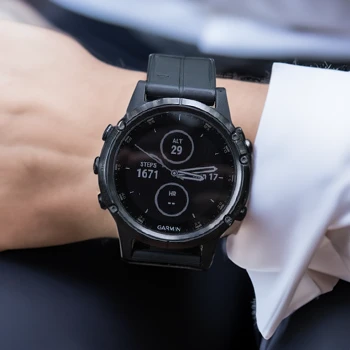
- Dimensions : 1.7" x 0.6" x 1.7"
- Maintenance : Easy
- Design : Compact
- Warranty : Yes (30 days return)
- Premium materials : Yes (Stainless steel bezel and back case)
Pros and Cons
Pros
- Available with a large watch face for easy to read info
- Shows maps directly on the display
- Should also help for recovery and sleep tracking
- Has a decent battery life
Cons
- Some iPhone connectivity issues in the past
Who is it for?
Who is it for?
- Serious cyclists, Performance-focused athletes
Who is it not for?
- Casual users
Final Verdict
Top-tier features and performance; ideal for serious cyclists. Its advanced metrics justify the high price.
he built-in GPS effectively tracked my routes and displayed maps, though not detailed enough for intricate navigation.
As a health and performance coach, I've found its optical heart rate monitor closely matches chest strap readings, demonstrating accuracy.
The battery life is commendable, lasting up to 7 days in smartwatch mode, and around 4 hours in GPS mode with music.
2 - Fitbit Versa 2 Health and Fitness Smartwatch (Best Value)
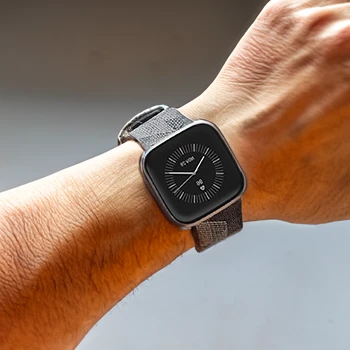
- Dimensions : 1.56" x 1.59" x 0.47"
- Maintenance : Easy
- Design : Modern
- Warranty : Yes (30 days return)
- Premium materials : No
Pros and Cons
Pros
- Sleek and clear display with all the data you need
- May provide real-time heart rate info to adjust your workout intensity
- Able to store all your fitness info in one app
- Improved battery life compared to other Fitbits
- Has Amazon Alexa built in
Cons
- GPS tracking only when connected to a phone
Who is it for?
Who is it for?
- Budget-conscious users, Everyday fitness enthusiasts
Who is it not for?
- Professional athletes
Final Verdict
Affordable and effective; great for daily fitness tracking. Lacks advanced features needed by pros.
The Versa 2 stands out as an affordable yet effective cycling tracker. Its heart rate monitoring is impressively accurate, and vital for adjusting training intensity.
Despite initial doubts due to its cost, my experience in a weekend cycling marathon was positive, with precise heart rate tracking and valuable sleep and recovery insights.
The Fitbit app's ability to set and track diverse daily goals, along with its seamless integration with other fitness apps, significantly enriched my fitness-tracking experience.
We loved that the Versa 2 has an improved battery life of 5 days, compared to the original Versa and the Fitbit Ionic.
Just keep in mind that you would also need to bring your phone’s built-in GPS data. But this does keep the cost down a lot.
3 - Apple Watch Series 8 (Best All-Rounder)
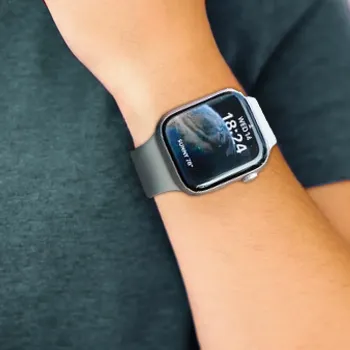
- Dimensions : 45mm
- Maintenance : Easy
- Design : Modern
- Warranty : Yes (15 days return)
- Premium materials : Yes (Aluminum case)
Pros and Cons
Pros
- Lots of color options that matches your style and taste
- Extremely comfortable to wear
- Highly accurate in all features
Cons
- Needs to be charged everyday
Who is it for?
Who is it for?
- Apple ecosystem users, Style-conscious individuals
Who is it not for?
- Android users
Final Verdict
High accuracy and comfort; excellent for everyday use. Battery life requires daily charging.
4 - Coros PACE 2 Premium GPS Sport Watch (Best GPS Precision)
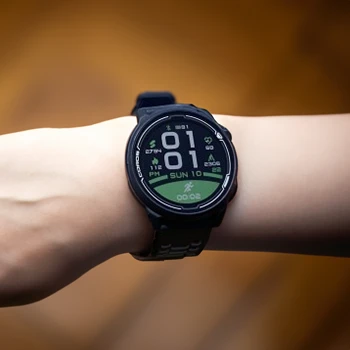
- Dimensions : 10.5" x 2.1" x 0.6"
- Maintenance : Easy
- Design : Lightweight
- Warranty : Yes (30 days return)
- Premium materials : No
Pros and Cons
Pros
- Seems to have a very accurate built in GPS chip
- Includes altimeter to get information about elevation changes on your route
- Claims to last up to 30 hours on GPS mode and 20 days on smartphone mode
Cons
- Some people find it a little bit bulky
Who is it for?
Who is it for?
- GPS-focused users, Long-distance cyclists
Who is it not for?
- Users needing a sleek design
Final Verdict
Outstanding GPS accuracy; perfect for long rides. Slightly bulky but worth it for GPS precision.
5 - Polar Vantage V Sports Watch (Best for Intensity-Based Training)
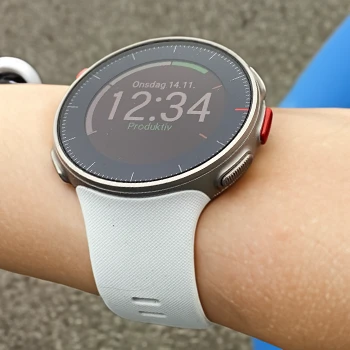
- Dimensions : Not provided
- Maintenance : Easy
- Design : Sturdy
- Warranty : Yes (30 days return)
- Premium materials : No
Pros and Cons
Pros
- Shows cardio load status to adjust your training intensity
- May track your recovery and sleep cycle for better exercise planning
- Easy to read display with information separated into different colors
Cons
- Some people have reported it to be a bit difficult to navigate the menus
Who is it for?
Who is it for?
- Intensity-based training, Competitive athletes
Who is it not for?
- Users preferring intuitive interfaces
Final Verdict
Great for intensity tracking; suitable for competitive training. Menu navigation can be complex.
We like the Polar Vantage V because of the cardio load function that it displays.
This is something that could become helpful if you are preparing for a competitive event where you need to achieve precise levels of intensity.
We also liked the way the information on the watch face is color-coded, which may make it easier to find the relevant information.
When we first started using it, we did note that it didn’t seem to be as intuitive and easy to navigate the settings, menus, and apps.
6 - Fitbit Charge 3 Fitness Activity Tracker (Cheapest Option)
- Dimensions : Not provided
- Maintenance : Easy
- Design : Compact
- Warranty : Yes (30 days return)
- Premium materials : No
Pros and Cons
Pros
- The sleek and small design may make it more comfortable
- May track over 15 different types of sports and exercises
- Simple features mean fewer distractions while you’re training
Cons
- GPS requires a smartphone connection
Who is it for?
Who is it for?
- Minimalists, Multi-sport enthusiasts
Who is it not for?
- Users needing built-in GPS
Final Verdict
Compact and versatile; good for multiple activities. GPS needs smartphone connection.
This Fitbit might be ideal for anyone that wants something small and sleek that might be barely noticeable.
It also comes with 15 different sport and exercise modes, which could make it a suitable activity tracker if you do multiple disciplines.
The overall functionality is also kept a bit simpler, with no distracting information on the display. It’s not as fancy as an actual smart watch, but that could be an advantage for some people.
The Charge 3 features do list GPS tracking but we found that this is only possible when connected to your smartphone.
7 - Polar M430 GPS Running Watch (Best Multi-Sport Fitness Tracker)

- Dimensions : Not provided
- Maintenance : Easy
- Design : Compact
- Warranty : Yes (30 days return)
- Premium materials : No
Pros and Cons
Pros
- Wearing it all day may give a full picture of activity and recovery
- Seems to have an accurate heart monitor for real time data
- The bright and clear display should provide important info at a glance
Cons
- Some people have reported sync issues with their smartphones
Who is it for?
Who is it for?
- Multi-sport users, 24/7 activity trackers
Who is it not for?
- Users requiring seamless syncing
Final Verdict
Accurate heart rate and activity tracking; good all-day wear. Sync issues can be a drawback.
The one thing we noticed in customer reviews is that there have been some issues with data synchronizing to your smartphone.
8 - Suunto 3 Sports Watch (Best User-Friendly)
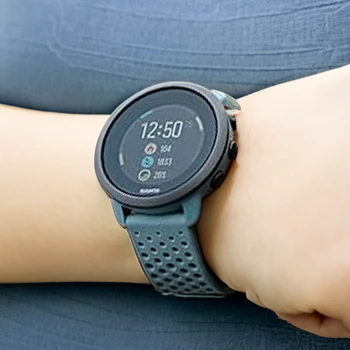
- Dimensions : Not provided
- Maintenance : Easy
- Design : User-friendly
- Warranty : Yes (30 days return)
- Premium materials : No
Pros and Cons
Pros
- Positive reports about the sleep and recovery tracking
- Easy to read display should suit most cyclists
- Heart rate tracking seems to be accurate
Cons
- GPS features require a smartphone
Who is it for?
Who is it for?
- User-friendly interface seekers, Sleep and recovery trackers
Who is it not for?
- Users needing independent GPS
Final Verdict
Easy to use with excellent recovery tracking. Requires smartphone for GPS features.
Just keep in mind that for the distance and pace tracking to work, you’ll need it to be connected to your phone as well.
9 - Withings Steel HR - Hybrid Smartwatch (Best Long-Lasting Battery Life)
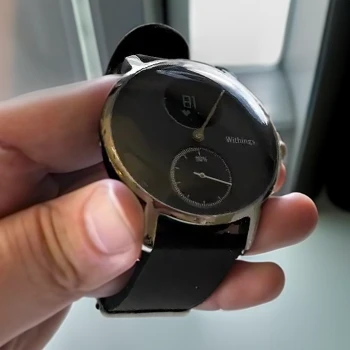
- Dimensions : Not provided
- Maintenance : Easy
- Design : Compact
- Warranty : Yes (30 days return)
- Premium materials : No
Pros and Cons
Pros
- Provides you with a sleep score to plan your daily activity better
- Claims to have up to 25 days of battery life
- The waterproof design could make it suitable for swimming
Cons
- Display of training data could be larger
Who is it for?
Who is it for?
- Long battery life seekers, Swimmers
Who is it not for?
- Users needing large data display
Final Verdict
Excellent battery life and waterproof design. Display size might be limiting for detailed data.
10 - Fitbit Ionic Watch
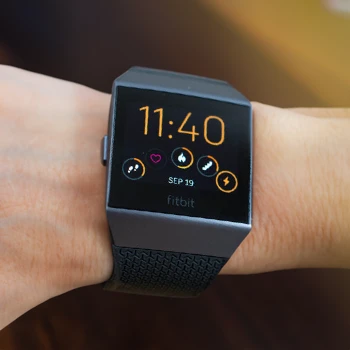
- Dimensions : Not provided
- Maintenance : Easy
- Design : Modern
- Warranty : Yes (30 days return)
- Premium materials : No
Pros and Cons
Pros
- The nice low-profile design may make it more comfortable
- Claims to have more than four days of battery life
- GPS data seems to work well for pace and distance
Cons
- Limited customizations for information display
Who is it for?
Who is it for?
- Casual users, Style-conscious individuals
Who is it not for?
- Users needing highly customizable displays
Final Verdict
Comfortable with good battery life; suitable for general use. Limited display customization.
The Fitbit Ionic offers both leather and plastic straps, catering to a range of styles from formal to casual.
However, its smaller display may limit at-a-glance readability, a factor to consider based on personal preference.
How We Tested the Products
In our quest to identify the top fitness trackers for cycling, my team and I adhered to a specific, rigorous set of criteria:
- GPS functionality: We rigorously tested each tracker's GPS accuracy on various routes, ensuring reliable location tracking essential for cyclists.
- Battery life: Recognizing the need for longevity, we evaluated the battery life of each tracker under different conditions, aiming to find a balance between functionality and endurance.
- Heart rate monitoring: We compared the heart rate sensors of the trackers with medical-grade equipment for precise accuracy, a critical feature for both performance tracking and safety.
- Water resistance: We exposed the trackers to varying moisture levels to guarantee their resilience against the elements, a necessity for outdoor cycling.
- Compatibility with cycling apps and accessories: We assessed each tracker's integration with popular cycling apps and accessories, ensuring seamless data synchronization and enhanced user experience.
Our approach combined technical research with real-world feedback, allowing us to understand the trackers' performance in actual cycling scenarios. This comprehensive evaluation led us to select the best fitness trackers that excel in the cycling domain.
Buyer’s Guide
1 - Easy To Use Display
Our research showed that a large display isn't necessary for a fitness tracker; usability is key. We encountered devices with large screens but tiny fonts, necessitating close inspection.
It's crucial to review various display layouts, including settings and menus, focusing on the main summary screen for clarity and ease of use during cycling.
2 - Accurate GPS Tracking
While many fitness trackers feature GPS, details matter. Some require smartphone connection for GPS functionality, a downside for those preferring not to carry a phone. Budget-conscious users might find this a viable option. We recommend checking user reviews for GPS accuracy.
3 - Battery Life And Charging Time
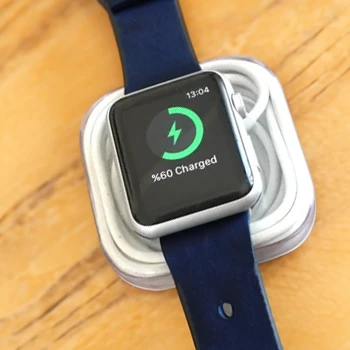
Don't be misled by claims of extended battery life. For example, Apple Watches offers numerous features but may need daily charging [1]. Simpler models like Fitbits can last up to a week. Consider the trade-off between features and charging frequency.
“Apple says that in general, using the Apple Watch battery life will last around 18 hours between charges. This figure was arrived at from tests in which an Apple Watch was paired with an iPhone and used for a variety of typical uses.”
- Karen Haslam, Editor at MacWorld
4 - Compatibility With Smartphones
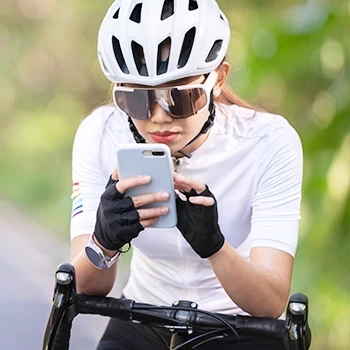
Apple Watch, for instance, only pairs with iPhones, a limitation for Android users. I have to admit, that’s a limitation, but most owners tend to be Apple fans to start with.
“So the short and simple answer is no, you cannot use an Apple Watch with Android Phones. The less simple answer is that you can sort-of, kind-of, get it to tersely exchange data with an Android phone. However, this is a severely limited setup and we can’t really recommend it.”
- Sydney Butler, Writer at 9to5Google.com
Most trackers we recommend are compatible with various operating systems, including iOS and Android, and sync well with popular health and fitness apps.
5 - Comfortable Strap Adjustments
Modern trackers offer interchangeable straps for comfort and style, a significant improvement from earlier models. It's important to choose a tracker with a strap that ensures comfort for all-day wear.
6 - Water Resistance
Fitness trackers typically have water resistance ratings, measured in atm (atmospheric pressure units). A rating of 1 atm offers basic splash resistance, suitable for cycling.
For activities like swimming, a higher rating, such as 3 atm, is advisable. Ensure the tracker's water resistance is adequate for your intended use.
7 - Heart Rate Monitor

Recent advancements have made wrist-based heart rate monitors nearly as accurate as chest strap models. Accurate heart rate monitoring is essential for training within the correct intensity zones.
8 - Recovery Tracking
The final thing we like to see on the best fitness trackers is sleep and recovery features.
When you get a better understanding of how well you sleep at night, then you should be in a good position to better plan your training. According to Sleep Doctor, sleep is one of the most important factors when it comes to muscle recovery [2].
Opt for trackers that provide detailed sleep analysis, including deep and REM sleep phases, if your budget allows.
Looking for an exercise tracker but not for cycling? Check out our reviews of the best trackers for your needs:
9 - Cycling Modes
Look for trackers with specific cycling modes and features like GPS, altimeter, and heart rate tracking to analyze cycling-specific data such as speed, distance, and calories burned.
In addition to cycling, we also reviewed trackers suitable for weightlifting, swimming, Crossfit, and those designed for smaller wrists. Each tracker's suitability varies based on the sport and the specific data it can track and analyze.
How Much Do I Need to Spend?
You need to spend around $25 on fitness trackers, which may include simple GPS features and heart tracking up to $600 for built-in GPS, offline music support, and generous battery life.
Budget-friendly options under $100, suitable for activities like walking, may lack a display and require smartphone connectivity to view daily steps.
Higher-end models, typically above $100, include built-in GPS and heart rate monitoring, ideal for athletes and rigorous sports activities. Always purchase from reputable sources to avoid low-quality products.
For home gym enthusiasts, consider a specialized gym clock or timer as an alternative to fitness trackers.
FAQs
Which Fitbit Is Best for Cycling?
The best Fitbit for cycling is the Versa 2. Many cyclists favor it because it’s affordable and still provides plenty of features, including measuring your heart rate.
Can Fitbits Track Cycling?
Yes, some Fitbits can track cycling. You would have to look for those with GPS features to allow you to track your distance and pace. These are helpful for mountain biking and cycling.
How Accurate Is the Apple Watch for Cycling?
The Apple Watch is pretty accurate for cycling as it seems to provide precise GPS location data. Even some slight variations in handling the GPS signal could lead to significant variations in the cycling data.
The products featured on this list track GPS data quite accurately as per our testing.
What Is The Best Fitness Tracker For Cyclists?
After extensive testing and comparison of various fitness trackers, my team and I unanimously agree that the Garmin fēnix 5S Plus stands out as the best choice for cycling enthusiasts.
Our hands-on experience, coupled with thorough research, demonstrated its superior GPS accuracy, robust design, and versatile features.
Its precise heart rate monitoring and extended battery life significantly enhanced our cycling sessions.
Based on our collective testing and analysis, I confidently recommend the Garmin fēnix 5S Plus as the optimal fitness tracker for cyclists seeking reliability and advanced functionality.
Our #1 Recommendation
Garmin fēnix 5S Plus (Best Overall)

Rated With Total Shape's Scoring System
- Available with a large watch face for easy to read info
- Shows maps directly on the display
- Should also help for recovery and sleep tracking
- Has a decent battery life
- Some iPhone connectivity issues in the past
About The Author
You May Also Like

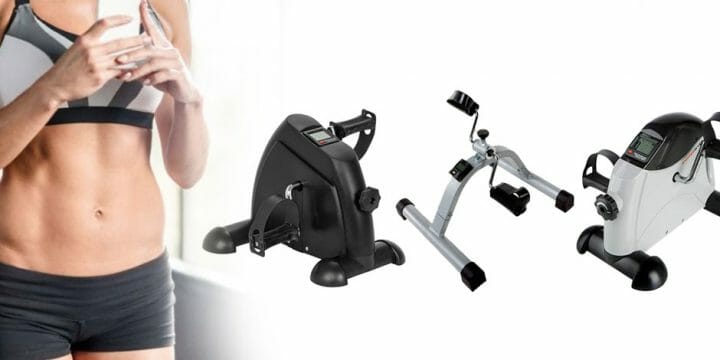
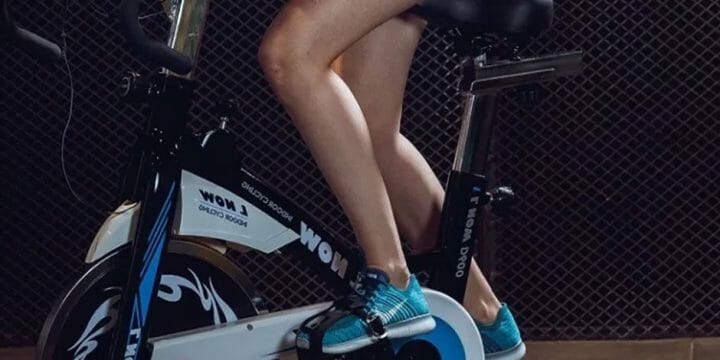
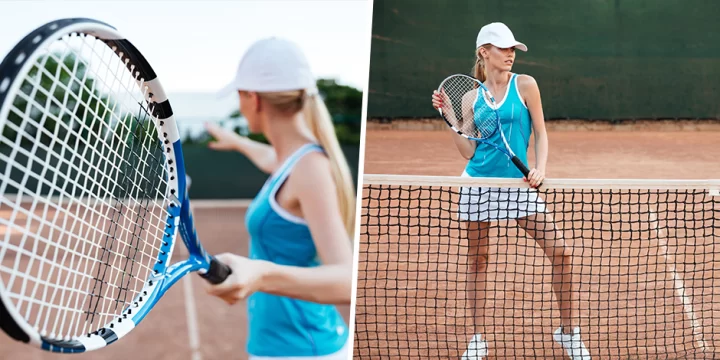

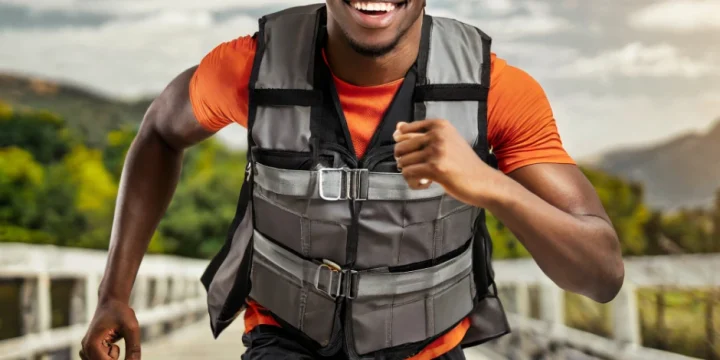
I’ve found wrist fitness trackers to be super helpful in monitoring my health while cycling, especially for tracking heart rate and distance.